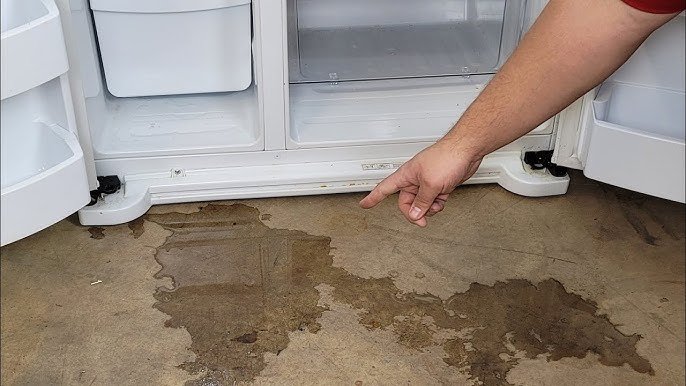Refrigerator Leaks in Orlando: Identifying the Source and Preventing Water Damage

A leaky refrigerator might seem like a minor inconvenience, but it can lead to significant water damage and costly repairs if not addressed promptly. Homeowners in Orlando, where humidity levels are often high, need to be particularly vigilant. Moisture issues from a leaking refrigerator can escalate quickly, causing damage to flooring, cabinetry, and even your appliance itself. This guide will help you understand the common causes of refrigerator leaks, how to identify the source, and what steps to take to prevent water damage in your home.
Common Causes of Refrigerator Leaks
Refrigerator leaks often stem from a few key issues, most of which are preventable with regular maintenance. Let’s explore the most common culprits:
- Defrost Drain Blockage
The defrost drain is responsible for channeling excess moisture from your refrigerator’s interior to a drain pan beneath the appliance. When the drain becomes clogged—typically due to food debris, dirt, or ice buildup—water has nowhere to go. This results in pooling inside your fridge or underneath it. - Faulty Water Line
Refrigerators equipped with ice makers or water dispensers rely on water lines to function. Over time, these lines can develop cracks, leaks, or loose connections. Even a small leak in the water line can cause significant puddles to form. - Damaged Door Seals (Gaskets)
The rubber seals around your refrigerator doors, known as gaskets, ensure that cold air stays inside while warm air is kept out. When these seals become worn, cracked, or misaligned, they allow warm air to enter. This creates excess condensation, which can eventually drip out of the fridge.
How to Identify the Source of the Leak
Pinpointing the source of a refrigerator leak might seem tricky, but with a systematic approach, it’s easier than you think. Here’s a step-by-step guide to help you locate the issue:
- Check the Water Line
Start by inspecting the water line behind your refrigerator. Look for visible cracks, loose connections, or moisture along the tubing. A damp floor near the back of the appliance often indicates a water line issue. - Examine the Drain Pan
Every refrigerator has a drain pan at the bottom, which collects excess moisture. If the pan is damaged, improperly positioned, or overflowing, it could be the cause of the leak. Carefully pull the pan out and check for cracks or excessive water accumulation. - Inspect the Defrost Drain
Open your refrigerator and examine the interior for pooling water near the back wall. If you spot ice or water, it’s likely due to a clogged defrost drain. To confirm, check the back of the fridge for any water running down into the drain pan. - Test the Door Seals
Close your refrigerator’s door on a sheet of paper. If you can easily pull the paper out without resistance, the door gasket may be damaged or misaligned. Poor seals can lead to moisture buildup and eventual leaks.
Preventing Water Damage from Refrigerator Leaks
Once you’ve identified the source of a leak, it’s crucial to address it promptly to avoid further water damage. Additionally, following these preventative measures can help keep your refrigerator running smoothly and your home safe from leaks:
- Perform Routine Maintenance
Regularly clean the defrost drain to prevent clogs. A mixture of warm water and mild soap can be flushed through the drain using a turkey baster to remove debris or ice. - Inspect Water Lines Periodically
Check the water line behind your fridge for wear and tear every few months. If you notice cracks or leaks, replace the tubing promptly. Tighten any loose connections to prevent leaks before they start. - Replace Worn Door Seals
Damaged or worn gaskets should be replaced immediately to ensure a tight seal. If you’re unsure how to replace them, a professional technician specializing in refrigerator repair Orlando can help. - Monitor the Drain Pan
Make it a habit to empty and clean the drain pan beneath your fridge every six months. This will prevent overflow and ensure proper drainage. - Keep Your Floors Protected
To minimize potential water damage, place a waterproof mat or tray underneath your refrigerator. This simple step can protect your flooring in case of an unexpected leak.
When to Call a Professional
While some refrigerator leaks can be fixed with DIY solutions, certain problems require the expertise of a professional. If you’ve tried troubleshooting without success, or if the issue seems too complex, it’s best to reach out to an experienced Orlando refrigerator repair technician. They’ll be able to quickly diagnose the problem, repair your appliance, and help you avoid further damage.
The Bottom Line
A leaking refrigerator can lead to significant water damage if left unchecked, but most leaks are preventable with regular maintenance and prompt repairs. By understanding the common causes of refrigerator leaks, identifying the source, and taking proactive steps to protect your home, you can avoid costly repairs and keep your fridge running efficiently.
For homeowners in Central Florida, addressing refrigerator leaks is essential for maintaining a safe and functional living space. If you’re struggling to resolve a leak, don’t hesitate to contact a trusted professional specializing in refrigerator repair Orlando. They’ll help you keep your appliance in top shape and ensure your home stays free from water damage.



